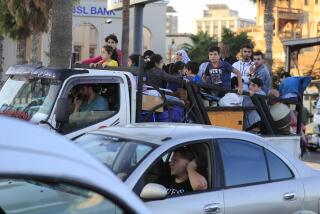Sunni militants blamed for Syria, Lebanon blasts
BEIRUT — Lebanese and Syrian authorities on Monday each placed blame for recent bombings in their countries on Islamic militants tied to Al Qaeda and probably based in a Palestinian refugee camp in Lebanon.
On Monday, a roadside bomb struck a bus in the northern Lebanese city of Tripoli, killing four Lebanese soldiers and a civilian and injuring 30 people, Lebanese officials said. The attack came two days after a 440-pound bomb detonated in a pedestrian area of Damascus, the Syrian capital, killing 17 people.
A senior Lebanese security official said authorities suspect that Jund al Sham, a militant group that was first detected in Afghanistan in the late 1990s and which surfaced in Lebanon around 2004, was responsible for the attacks. The official said the bombings were carried out in revenge for the Lebanese military’s defeat last year of Fatah al Islam, an ally of the militant group, in a months-long battle around the Palestinian refugee camp of Nahr el Bared.
“They are declaring a terrorist war against the Lebanese army to avenge the battle of Nahr el Bared and to demoralize the army and regain the influence that they lost in the last battles,” said the official, who requested anonymity.
“They are not an organization that has a known command or known spokesman,” he said. “They’re linked to Al Qaeda and have bases in the Palestinian camps,” which retain semiautonomous status in Lebanon.
Syrian officials on Monday also suggested that evidence in the Damascus car bombing pointed to an Islamic group in Lebanon, though they did not name the group. In an official statement, Syria said the vehicle used had entered the country a day before the bombing and the alleged driver, who died in the blast, was linked to the group by suspects in custody.
Syrian authorities have complained that mostly Sunni northern Lebanon has become a hotbed of Islamic extrem- ism in recent years, drawing some veterans of the Iraq insurgency.
Radical Sunni groups, often members of the puritanical Salafi movement, have been increasingly active in Lebanon, angered by the perception that the army is allied with the Shiite Muslim militia Hezbollah and that Lebanon’s most prominent Sunni leader, Saad Hariri, is ineffectual.
“While the Salafis will take his money, they are less inclined to rest their fate in his sometimes shaky hands,” said Augustus Richard Norton, a Lebanon expert at Boston University. “There have been deep worries in Lebanon . . . about the resurgence of Salafi groups, especially in the environs of Tripoli.”
Television footage of the scene of Monday’s bombing showed charred automobiles, bloodstains on the pavement, tiny pieces of metal and burnt flesh.
Soldiers scrambled to cordon off the site after the morning rush-hour attack. Interior Minister Ziad Baroud summoned security officials for an emergency meeting.
The U.S. Embassy suspended all travel by its personnel to Tripoli and advised Americans to avoid the city. Syria called the attack “a terrorist and criminal act.”
In recent weeks, thousands of Syrian troops have massed along the northern Lebanese frontier in a move some analysts described as an attempt to keep Lebanon’s troubles from seeping into Syria.
--
Special correspondents Gheith Al-Amin in Beirut and Ziad Haidar in Damascus contributed to this report.
More to Read
Sign up for Essential California
The most important California stories and recommendations in your inbox every morning.
You may occasionally receive promotional content from the Los Angeles Times.










